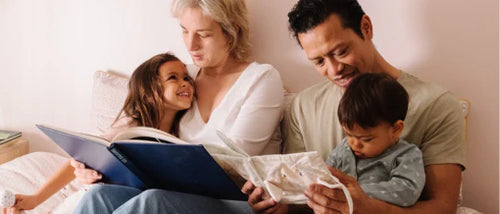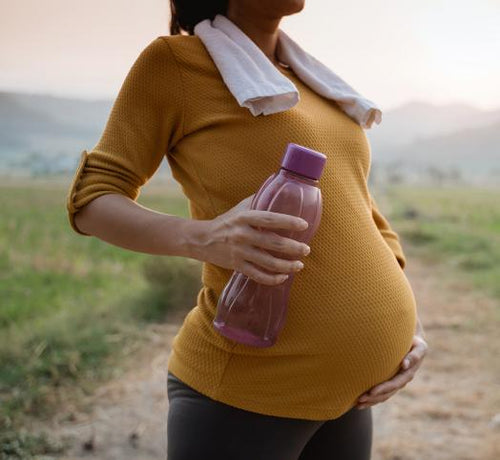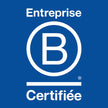WATER: THE ONLY ESSENTIAL DRINK
The human body is 65% water. Water is therefore the main constituent of the body's cells and without it, there is no life. It nourishes, provides essential mineral salts and trace elements and allows the evacuation of toxins. And as it is constantly eliminated from the body (sweating, stools, breathing), it must be replenished.
Even more so during pregnancy since hormonal changes stimulate the activity of the sweat glands which secrete sweat.
For you :
Good hydration benefits your entire body. The blood then being more fluid, the heart can easily propel it towards the organs and muscles to nourish and oxygenate them... which considerably limits the risk of cramps, strains and venous disorders! Being well hydrated also allows you to counter episodes of urinary infections, which are never desirable during pregnancy. Without forgetting that your epidermis, too, needs water to counterbalance the hormonal influx which weakens it and makes it more easily subject to itching, tightness, stretch marks and sagging.
For your baby:
Your hydration affects the volume of amniotic fluid which reaches approximately 1 liter at term. And when this fluid is in sufficient quantity and of good quality, it promotes good in-utero development and effectively plays its role as a protective barrier.
SUMMER AND WINTER, ALWAYS DRINK BEFORE YOU ARE THIRSTY
As soon as the feeling of thirst appears, the dehydration process has already begun. However, 1% dehydration = 1 liter of water lost = 10% less organic performance. So drink regularly throughout the day, in small sips, to slowly reach the recommended water ration of 1.5 to 2 liters of water, or even more according to medical advice. And this, summer and winter: when it is cold, we also lose water through perspiration but also through breathing (the mist that comes out of the mouth is water).
Overall and only through perspiration, water loss is 500ml/hour in winter and 800ml/hour as soon as the temperature reaches 20°C! As dehydration occurs quickly, also remember to check the clarity of your urine: it is the master standard of a good water reserve.
WATER, BUT WHAT WATER?
It is obviously essential to opt for quality water. That from the tap is drastically controlled but its composition varies depending on the region, it is better to test the nitrate level before consuming it. And seek the doctor's advice.
In any case, always let it run for a few minutes before drinking it. Or, safer, prefer bottled water. Preferably flat (the bubbles encourage bloating) and weakly mineralized, low in sodium. But if the diet does not sufficiently cover the needs, water rich in calcium and magnesium may be recommended by the doctor.
In any case, you will make sure that no one drinks from the neck of your bottle and that you consume it within the day, once opened, to avoid any bacterial risk.
NOT TOO COLD, PLEASE
Drinking it cold when it's hot is tempting. But that's a mistake.
The internal temperature of the body being around 37.5°C, an influx of ice-cold water requires unnecessary effort from the body, forcing it to spend calories to warm it up before absorbing it. Not to mention that water that is too cold immediately gives such a sensation of rehydration that you don't quench your thirst to the right extent. Finally, it generates risks of gastrointestinal pain. The right water temperature? 18°C.
EATING IS ALSO DRINKING...
Hydration also comes from food: fruits and vegetables contain on average 90% water. Counting on 500g of vegetables and 300g of fruit per day is equivalent to swallowing more than half a liter of water. Milk and dairy drinks, composed of 50 to 80% water, also offer a good water supplement. A well-chosen diet can therefore help you compensate for a lack of hydration but in no case replace it!
If pure water really makes you grimace, opt for herbal teas or infusions.




